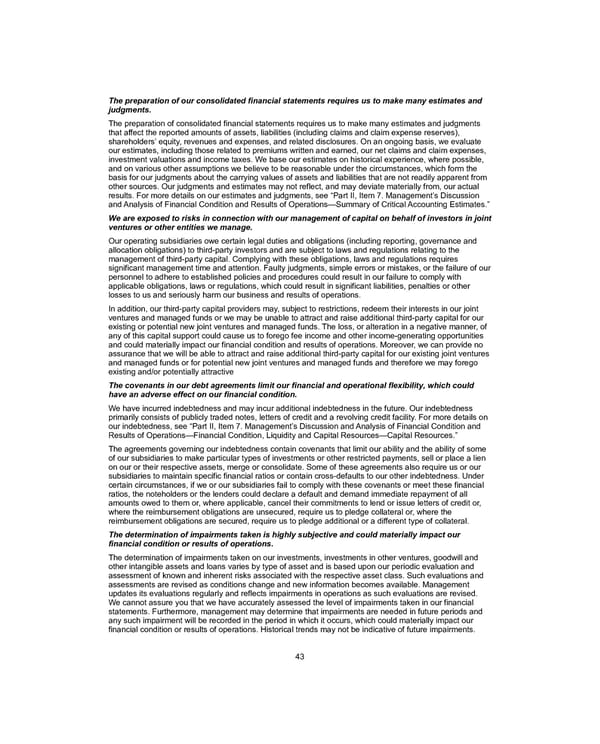The preparation of our consolidated financial statements requires us to make many estimates and judgments. The preparation of consolidated financial statements requires us to make many estimates and judgments that affect the reported amounts of assets, liabilities (including claims and claim expense reserves), shareholders’ equity, revenues and expenses, and related disclosures. On an ongoing basis, we evaluate our estimates, including those related to premiums written and earned, our net claims and claim expenses, investment valuations and income taxes. We base our estimates on historical experience, where possible, and on various other assumptions we believe to be reasonable under the circumstances, which form the basis for our judgments about the carrying values of assets and liabilities that are not readily apparent from other sources. Our judgments and estimates may not reflect, and may deviate materially from, our actual results. For more details on our estimates and judgments, see “Part II, Item 7. Management’s Discussion and Analysis of Financial Condition and Results of Operations—Summary of Critical Accounting Estimates.” We are exposed to risks in connection with our management of capital on behalf of investors in joint ventures or other entities we manage. Our operating subsidiaries owe certain legal duties and obligations (including reporting, governance and allocation obligations) to third-party investors and are subject to laws and regulations relating to the management of third-party capital. Complying with these obligations, laws and regulations requires significant management time and attention. Faulty judgments, simple errors or mistakes, or the failure of our personnel to adhere to established policies and procedures could result in our failure to comply with applicable obligations, laws or regulations, which could result in significant liabilities, penalties or other losses to us and seriously harm our business and results of operations. In addition, our third-party capital providers may, subject to restrictions, redeem their interests in our joint ventures and managed funds or we may be unable to attract and raise additional third-party capital for our existing or potential new joint ventures and managed funds. The loss, or alteration in a negative manner, of any of this capital support could cause us to forego fee income and other income-generating opportunities and could materially impact our financial condition and results of operations. Moreover, we can provide no assurance that we will be able to attract and raise additional third-party capital for our existing joint ventures and managed funds or for potential new joint ventures and managed funds and therefore we may forego existing and/or potentially attractive The covenants in our debt agreements limit our financial and operational flexibility, which could have an adverse effect on our financial condition. We have incurred indebtedness and may incur additional indebtedness in the future. Our indebtedness primarily consists of publicly traded notes, letters of credit and a revolving credit facility. For more details on our indebtedness, see “Part II, Item 7. Management’s Discussion and Analysis of Financial Condition and Results of Operations—Financial Condition, Liquidity and Capital Resources—Capital Resources.” The agreements governing our indebtedness contain covenants that limit our ability and the ability of some of our subsidiaries to make particular types of investments or other restricted payments, sell or place a lien on our or their respective assets, merge or consolidate. Some of these agreements also require us or our subsidiaries to maintain specific financial ratios or contain cross-defaults to our other indebtedness. Under certain circumstances, if we or our subsidiaries fail to comply with these covenants or meet these financial ratios, the noteholders or the lenders could declare a default and demand immediate repayment of all amounts owed to them or, where applicable, cancel their commitments to lend or issue letters of credit or, where the reimbursement obligations are unsecured, require us to pledge collateral or, where the reimbursement obligations are secured, require us to pledge additional or a different type of collateral. The determination of impairments taken is highly subjective and could materially impact our financial condition or results of operations. The determination of impairments taken on our investments, investments in other ventures, goodwill and other intangible assets and loans varies by type of asset and is based upon our periodic evaluation and assessment of known and inherent risks associated with the respective asset class. Such evaluations and assessments are revised as conditions change and new information becomes available. Management updates its evaluations regularly and reflects impairments in operations as such evaluations are revised. We cannot assure you that we have accurately assessed the level of impairments taken in our financial statements. Furthermore, management may determine that impairments are needed in future periods and any such impairment will be recorded in the period in which it occurs, which could materially impact our financial condition or results of operations. Historical trends may not be indicative of future impairments. 43
 2021 Annual Report Page 58 Page 60
2021 Annual Report Page 58 Page 60